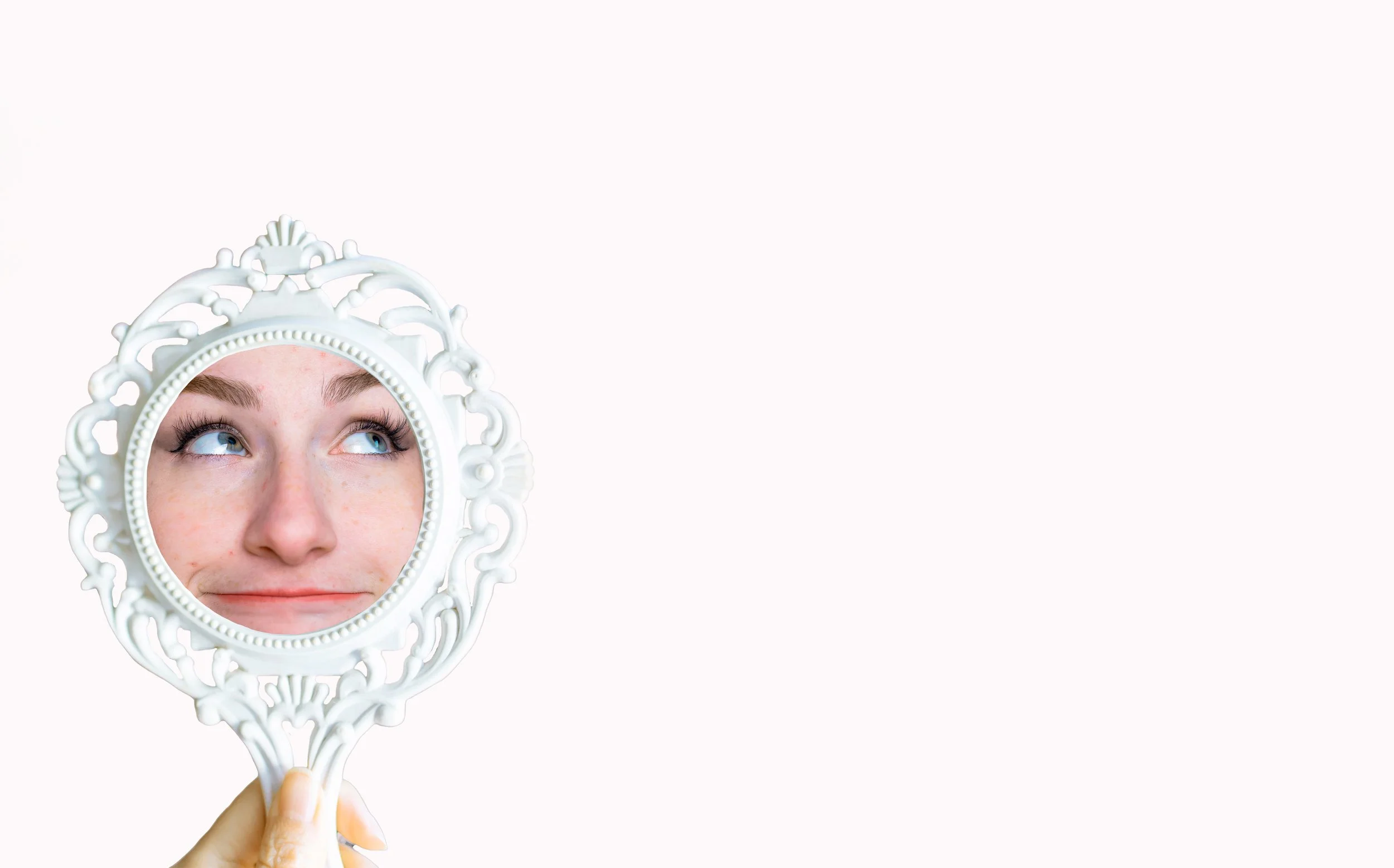The Mirror Isn't Neutral: How Your Reflection Became a Surveillance State
It's 2 AM, and you're stumbling to the bathroom half-asleep, just trying to pee in peace. But then the motion sensor light kicks on with all the mercy of a police interrogation lamp, and there you are caught in fluorescent purgatory, face-to-face with your own reflection.
For a split second, you think, "Jesus, who is that ghoul?" Your hair is doing something that defies both gravity and logic. Your face has pillow creases that look like ancient battle scars. And there's this moment, this terrible, vulnerable moment, where you actually judge yourself. At 2 AM. For looking like a human who was sleeping.
Here's the catch: that wasn't an accident. That moment of self-criticism wasn't some personal failing or bad luck with bathroom lighting. It was by design. Those mirrors, that lighting, that split-second of "ugh, I look awful"? Someone's making money off your 2 AM self-loathing.
It turns out your mirror isn't just showing you your face; it's selling it back to you.
When Mirrors Became Mean Girls
Let me blow your mind for a second: our great-grandmothers saw themselves clearly, maybe once a week, if they were lucky. They had small, precious mirrors that were treated like family heirlooms. Most people went about their daily lives without constantly checking their appearance, because, frankly, there was nothing to compare it to.
Fast-forward to today, and women check themselves in mirrors 38 times a day, with Gen Zers looking at themselves more than any other generation. We see ourselves constantly in phone cameras, security monitors, Zoom calls, social media stories, car windows, literally any reflective surface. We've transitioned from a scarcity of reflection to an overdose of reflection.
And somehow, despite seeing ourselves more than any generation in human history, we feel worse about how we look.
We traded self-acceptance for self-surveillance and called it progress.
The Smart Mirror Conspiracy
This is where things get really dystopian. Enter the "smart mirror" revolution because apparently, regular mirrors weren't judgmental enough.
The global smart mirror market was valued at $1.8 billion in 2024 and is projected to reach $6 billion by 2034. These aren't just mirrors with LED lights (though those are part of the problem too). These are full-blown surveillance devices disguised as bathroom accessories.
Take HiMirror, which analyzes your skin's condition, including wrinkles, fine lines, dark circles, dark spots, red spots, roughness, and pores, using just a photo. It gives you a score on a scale of 0-100, with 100 being the best. And then, this is the truly evil part, it recommends products for you to buy based on all the "problems" it has just identified.
Sephora's virtual try-on features analyze your face in real-time to show you 847 different ways you could look "better." Instagram filters do the same thing, but with the added bonus of making you forget what your actual face looks like.
The "beauty tech" market hit $4.3 billion in 2025, and spoiler alert: they're not making that money by telling you that you look great exactly as you are. They're literally in the business of identifying problems with your face that you didn't know you had, then selling you solutions.
Your 2 AM mirror anxiety isn't a personal failing; it's a business model.
Your Brain on Reflection Overdose
Here's the thing about constant self-checking: it adds up. What feels like a harmless glance here and there can easily turn into dozens of mini-inspections every single day. Imagine tallying it up and realizing you've looked at yourself 74 times in 24 hours, seventy-four chances to find something wrong, and not once walking away feeling better.
This is what constant self-surveillance does to us. Researchers have found that 55 percent of surgeons report requests from patients to alter their appearance to make them look better in selfies. People are getting cosmetic surgery to look like their filtered selves, a phenomenon psychologists call "Snapchat dysmorphia."
According to a 2022 survey by the American Academy of Facial Plastic and Reconstructive Surgery, 79% of plastic surgeons reported a trend of patients seeking improvement to look better in selfies. We're not just seeing ourselves anymore, we're surveilling ourselves. And that surveillance is driving us literally insane.
As one researcher put it, "Filtered selfies often present an unattainable look and are blurring the line of reality and fantasy for these patients." Your brain can literally become desensitized to the difference between a filtered selfie and reality after enough exposure.
We've become our own surveillance state, one selfie at a time.
The Economics of Insecurity
Want to know who profits when you hate your reflection? Let's follow the money trail.
The beauty industry: $532 billion annually. Cosmetic procedures have increased by 200% since Instagram launched. Smart mirrors that "analyze" your skin: growing at a rate of 12.9% annually. Beauty apps that point out your "flaws": billions in revenue.
Even your bathroom lighting is designed to make you look awful. Those harsh, overhead fluorescent lights in dressing rooms? That's not an accident. Retail stores are aware that unflattering lighting prompts customers to purchase more makeup to "fix" the perceived issues.
Social media algorithms boost content that makes you feel insecure because insecure people scroll more, engage more, and buy more. Your insecurity literally keeps the lights on at Meta headquarters.
Here's the most insidious part: HiMirror stores photos along with measurement data, tracking your progress over time. They're not just analyzing your face; they're building a database of your insecurities to target you with products that are better suited. Every time you look in your smart mirror, you're feeding a machine learning algorithm designed to find new things wrong with you.
The system literally profits from your self-doubt. Every time you think, "I need to fix this about my face," someone makes money.
Breaking Free from Mirror Prison
Okay, I've thoroughly depressed you. But here's the good news: you can fight back. And it starts with understanding that your mirror isn't neutral, it's been weaponized against you.
Mirror Neutrality Practice: When you catch yourself in a reflection this week, ask: "What story am I telling myself about what I see? Who benefits from that story?" Practice looking at your reflection the way you'd look at a friend with curiosity, not criticism.
The Phone Flip Protocol: Turn your phone face down during conversations. Cover your laptop camera when you're not using it. Give yourself permission to exist without constant visual feedback. You are not a product that needs to be optimized.
Smart Mirror Resistance: If you own a smart mirror, turn off the "analysis" features. You don't need a machine telling you what's wrong with your face. If you're shopping for mirrors, buy dumb ones. The kind that just reflects light back at you without commentary.
The Reality Check: Women check mirrors 38 times a day on average. That's roughly every 26 minutes you're awake. Set a gentle goal to cut that in half. Notice how much mental energy you regain when you're not constantly preoccupied with performance and reviewing your appearance.
Every time you resist the urge to "check yourself," you're taking back power from a system designed to profit from your insecurity.
The Neutral Mirror Revolution
Here's what I want you to imagine: What if mirrors just showed light bouncing off surfaces? What if reflection were information, not evaluation? What if seeing yourself was as neutral as seeing a tree or a cloud?
Your great-grandmother looked in the mirror to see if she was clean and presentable. She didn't analyze her pore size or count her fine lines because there was no industry telling her those were problems that needed solving.
That 2 AM bathroom moment? In a neutral mirror world, you'd see yourself and think, "Yep, that's what a sleepy human looks like." No judgment. No products to buy. No problems to fix. Just a tired person who needs to pee.
We hereby declare our independence from mirrors that judge, apps that analyze, and reflections that lie. From now on, mirrors are simply made of glass. We are just humans. And that's exactly enough.
The mirror isn't neutral, but we are. We're done donating our insecurities to billion-dollar industries. We're done auditioning for our own reflections. From now on, the only one writing the story of your face is you.
By Sypharany.






